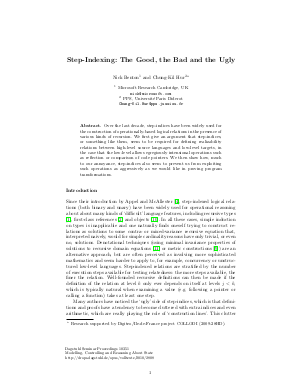Step-Indexing: The Good, the Bad and the Ugly
Authors Nick Benton, Chung-Kil Hur
-
Part of:
Volume:
Dagstuhl Seminar Proceedings, Volume 10351
Part of: Series: Dagstuhl Seminar Proceedings (DagSemProc) - License:
 Creative Commons Attribution 4.0 International license
Creative Commons Attribution 4.0 International license
- Publication Date: 2010-11-04
File

PDF
DagSemProc.10351.7.pdf
- Filesize: 343 kB
- 9 pages
Document Identifiers
Subject Classification
Keywords
- Step-Indexing
- Logical Relations
- Low-Level Languages
- Compiler Correctness
Metrics
- Access Statistics
-
Total Accesses (updated on a weekly basis)
0PDF Downloads0Metadata Views
Abstract
Over the last decade, step-indices have been widely used for the construction of operationally-based logical relations in the presence of various kinds of recursion. We first give an argument that step-indices, or something like them, seem to be required for defining realizability relations between high-level source languages and low-level targets, in the case that the low-level allows egregiously intensional operations such as reflection or comparison of code pointers. We then show how, much to our annoyance, step-indices also seem to prevent us from exploiting such operations as aggressively as we would like in proving program transformations.
Cite As Get BibTex
Nick Benton and Chung-Kil Hur. Step-Indexing: The Good, the Bad and the Ugly. In Modelling, Controlling and Reasoning About State. Dagstuhl Seminar Proceedings, Volume 10351, pp. 1-9, Schloss Dagstuhl – Leibniz-Zentrum für Informatik (2010)
https://doi.org/10.4230/DagSemProc.10351.7
BibTex
@InProceedings{benton_et_al:DagSemProc.10351.7,
author = {Benton, Nick and Hur, Chung-Kil},
title = {{Step-Indexing: The Good, the Bad and the Ugly}},
booktitle = {Modelling, Controlling and Reasoning About State},
pages = {1--9},
series = {Dagstuhl Seminar Proceedings (DagSemProc)},
ISSN = {1862-4405},
year = {2010},
volume = {10351},
editor = {Amal Ahmed and Nick Benton and Lars Birkedal and Martin Hofmann},
publisher = {Schloss Dagstuhl -- Leibniz-Zentrum f{\"u}r Informatik},
address = {Dagstuhl, Germany},
URL = {https://drops.dagstuhl.de/entities/document/10.4230/DagSemProc.10351.7},
URN = {urn:nbn:de:0030-drops-28085},
doi = {10.4230/DagSemProc.10351.7},
annote = {Keywords: Step-Indexing, Logical Relations, Low-Level Languages, Compiler Correctness}
}
